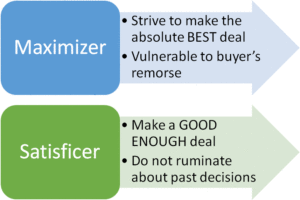In my last post, I chronicled various ways in which our decision-making strays from pure logic. In The Paradox of Choice: Why More is Less, Dr. Barry Schwartz looks at how our personalities impact the decision making process. He contrasts two opposing styles: maximizing and satisficing.
 Maximizers are driven to make THE best possible decision and secure THE best deal. They spend a lot of time shopping. They unearth a broad range of possibilities, perform detailed comparisons, and deliberate at length until they’ve arrived at their decisions. Yet having made that grand investment, they are vulnerable to buyer’s remorse and may ruminate on “hypotheticals” that might have landed them in more favorable positions. And if their decisions prove to have been unwise, they take a long time in recovery. Objectively speaking, they make better decisions than other types of buyers. However, they tend to be less happy, less satisfied, and less optimistic than their peers.
Maximizers are driven to make THE best possible decision and secure THE best deal. They spend a lot of time shopping. They unearth a broad range of possibilities, perform detailed comparisons, and deliberate at length until they’ve arrived at their decisions. Yet having made that grand investment, they are vulnerable to buyer’s remorse and may ruminate on “hypotheticals” that might have landed them in more favorable positions. And if their decisions prove to have been unwise, they take a long time in recovery. Objectively speaking, they make better decisions than other types of buyers. However, they tend to be less happy, less satisfied, and less optimistic than their peers.
By contrast, satisficers seek options that are “good enough.” With an appropriate air of superiority, maximizers label satisficers’ choices “mediocre.” Yet satisficers may be quite discriminating and expend a good deal of energy in the decision process. But they are good to go with choices that get the job done and don’t waste time and effort worrying about the “absolute best” option that might have slipped their notice. Decision made. Move on.
Of course, we’re not all pure maximizers or pure satisficers. In fact, we’re likely to be maximizers in some areas, and satisficers in others. However, we all tend to be nudged toward maximizing behaviors when concerned about status or fearful that our choices are somehow unalterable or life-changing. And we are also increasingly nudged in that direction by a proliferation of options.
In today’s world, we are overrun with choices. The average supermarket has tens of thousands of products. Cable television has hundreds of channels and competes with a dizzying array of entertainment on the Internet. A simple phone is no longer a simple phone nor are all the service options that go with it. And on and on. It’s a nightmare for maximizers and a powerful magnet for even the most stalwart satisficer. The net result: Americans lead the citizens of the world in time spent shopping, and we’re increasingly less gratified by the fruits of our labors.
Dr. Schwartz reminds us that time spent shopping and ruminating about our choices is time taken away from being a good partner, family member, friend, congregant, team player, etc. It’s also time taken away from being joyful!
Here’s his prescription for maximizing happiness in a world rife with choice:
- Choose when to choose. Invest time and energy on things that really matter; shorten or eliminate deliberation on unimportant things.
- Minimize your maximizing tendencies. As much as possible, opt for being a satisficer.
- Stop thinking about the attractiveness of the choices you didn’t make.
- Make decisions non-reversible. Pour your energy into valuing what you have.
- Practice gratitude.
- Regret less. And remember: A different choice may not have turned out any better!
- Expect the natural loss of enthusiasm about purchases down the road. Nothing is quite as exciting once you’ve gotten used to it.
- Control expectations.
- Curtail social comparisons.
- Set sensible constraints and stick with them. By following self-imposed guidelines, you can liberate yourself from having to re-hash the same (minor) decisions over and over again.